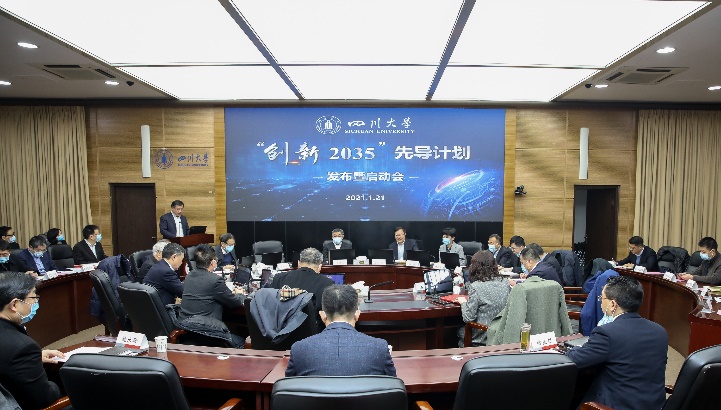
On Jan. 21, Sichuan University held a conference to launch the pilot program of “Innovation 2035” in Mingde building.
Drawing upon the breakthrough of big science problems and core technologies, the five major projects of "Material Structure Transparency Project, Future Medical Harbor Project, Integration of Heaven and Earth and Ecological EvolutionProject, Information Software and Underlying Algorithm Project, Mutual Learning Among Civilizations and Global Governance Research Project" aim to build a high-energy innovation platform and big scientific device. This program intends to timely connect with the major national plans and the major opportunities for the construction of scientific and technological innovation highland in Chengdu and Chongqing, promote the interdisciplinary integration and the development of discipline clusters, and produce a number of "from 0 to 1" original achievements, promoting SCU's advantageous disciplines to enter the forefront of the world. Thus, SCU has employed a number of academicians of the Chinese Academy of Sciences(CAS) and the Chinese Academy of Engineering(CAE) and distinguished professors of Sichuan University as the chief scientists of the pilot program.
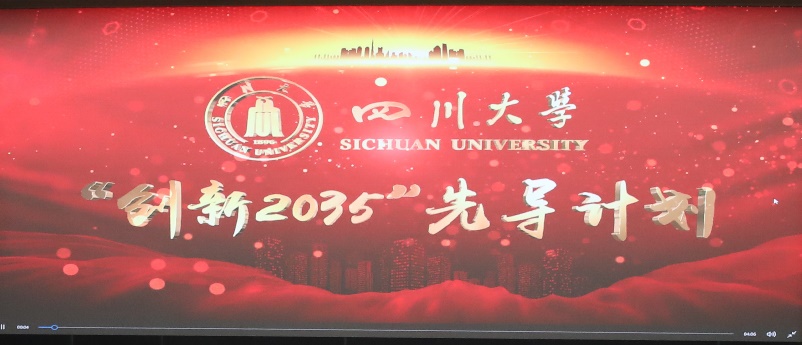
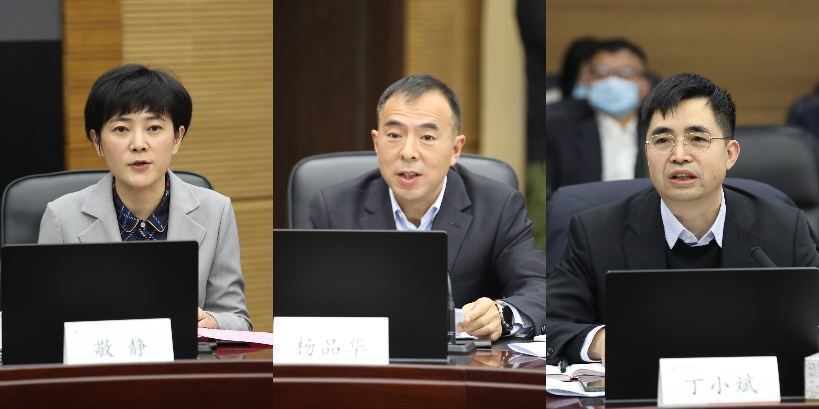
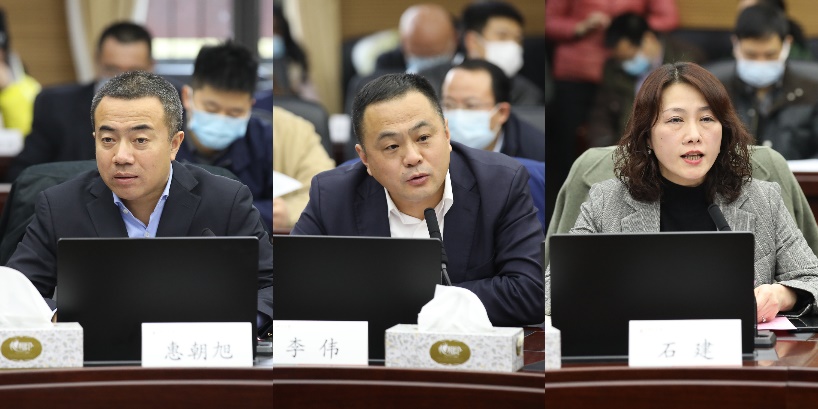
At the conference, Vice President Chu Liangyin introduced the main contents of the program on behalf of the university. Jing Jing, Yang Pinhua, Ding Xiaobin, Hui Zhaoxu, Li Wei and Shi Jian, on behalf of their respective units, congratulated on the launch of "Innovation 2035" and spoke highly of the program.
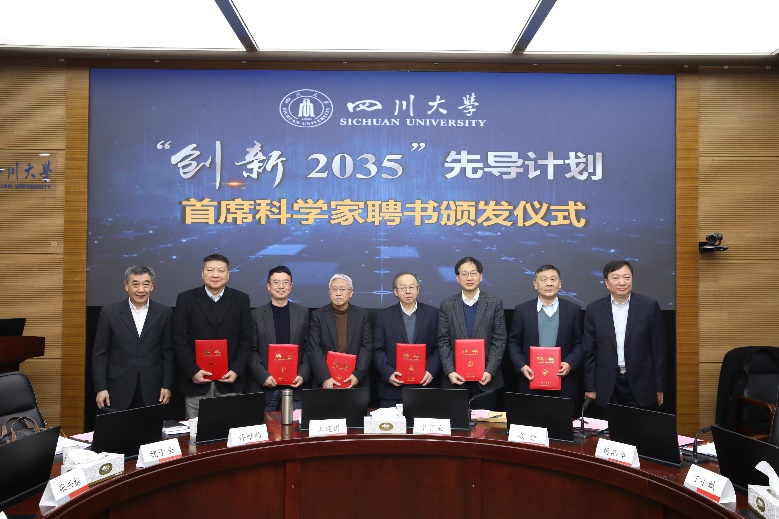
Chairman Wang Jianguo and President Li Yanrong presented letters of appointment to chief scientists, who are Zhang Xingdong, academician of CAE, Wei Yuquan, academician of CAS, Shi Bi, academician of CAE, Li An-min, academician of CAS, outstanding professors Cao Shunqing and Huo Wei.
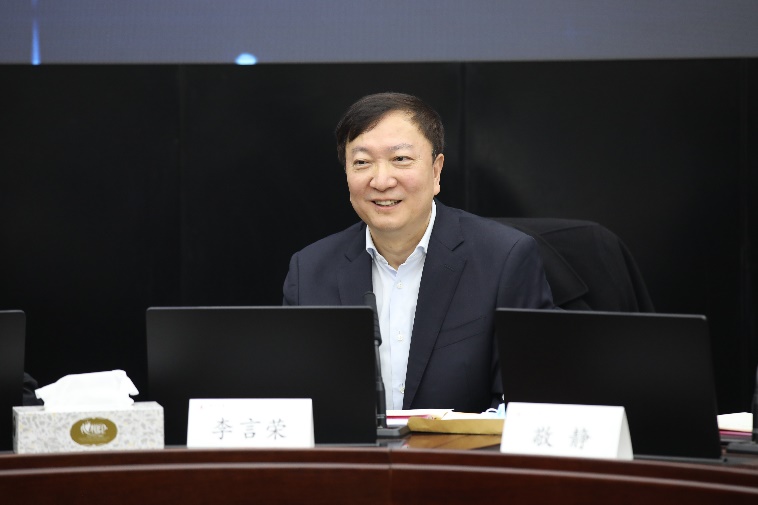
Li Yanrong gave a speech on behalf of the university and Chairman Wang Jianguo. He mainly focused on the three aspects of "why to do it", "how to do it" and "what will be the results after doing it". He said that as a high-level comprehensive university, SCU will be more active in linking up with national and regional strategies and serving local economic and social development. In the process of building China into a world power of science and technology, SCU should have the courage to put forward plans of Sichuan University, issue guidelines and make its due contribution. In the new phase of national “double first-class” development, SCU will explore a new way to create a world-class university in Western China in order to achieve higher quality and faster development. Against this backdrop, we decided to launch "Innovation 2035" in June and July last year when we began to formulate the 14th five-year plan of our university. Regarding "how to do it", he noted that the five pilot projects of "Innovation 2035" are all geared to major scientific issues, driven by key core technology breakthroughs and local industrial transformation and upgrading needs. They are initiated around the five major areas in material and energy, life and health, ecology and environment, information and software, civilization and governance. This program is the brainchild of the collective. In the process of its formation, opinions and suggestions from the academic committee of the university, famous professors of the liberal arts, science, engineering and medicine, and various colleges were solicited. The conditions for these five projects are basically mature, and some of them have started already. He said that we will give full play to the multi-disciplinary advantages of a comprehensive university, promote the interdisciplinary integration and innovative development of subject clusters, and create a new mode of construction and development of subject clusters naturally formed to solve major problems. He indicated that the program will have a team of chief scientists to establish their teams, transform planning into plans and guidelines into actions. The pilot projects will lead teachers and students to think, focus and solve the big science problems and make breakthrough in core and difficult technologies. On the "expected results", he pointed out that through the implementation of the five pilot projects, SCU should gather talent and make more original achievements "from 0 to 1". SCU will comprehensively accelerate the development of a double first-class university. We should make special contributions especially to the building of the Tianfu National Laboratory, National Comprehensive Medical Center and the Chengdu Future Science City and the Chengdu Future Medical City so as to assist the construction of Chengdu-Chongqing twin city economic circle, building China into a world science and technology power with SCU resources.
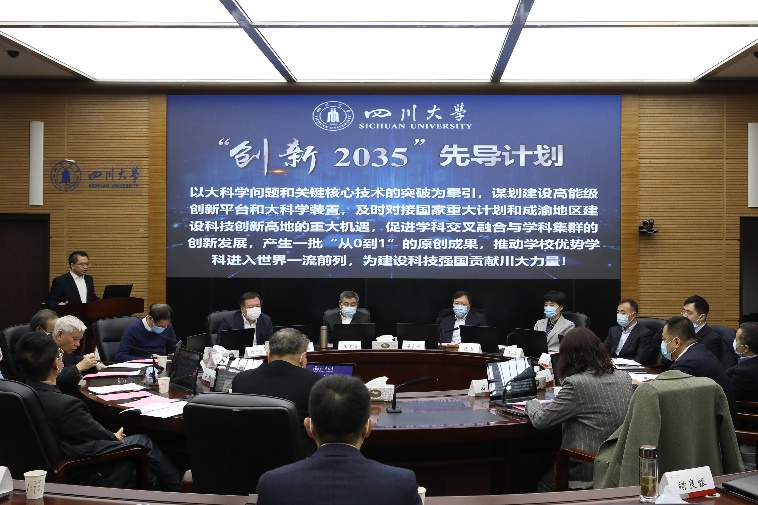
About the five projects of “Innovation 2035”:
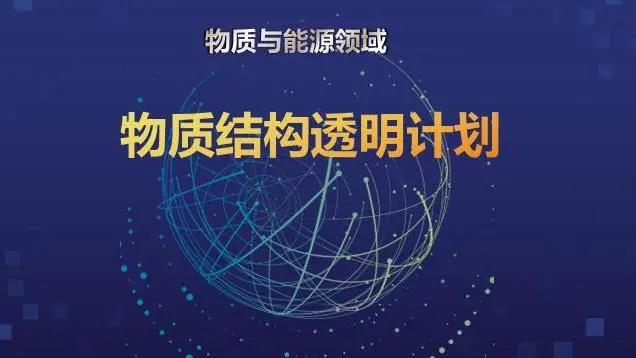
1. Material structure transparency project.
To get a clear observation and accurate analysis of the internal micro structure of materials by means of various kinds of radiation. It is similar to the high-definition perspective of the human body. In light of the needs of advanced materials, aerospace, intelligent manufacturing, electronic information, new energy and so on, we focus on the internal microstructure, high-throughput characterization, performance control, precise synthesis and evolution under extreme conditions to improve the research and development ability of new materials and devices. The project will take into consideration the development needs of the Chengdu Future Science City to build material microstructure research facilities and innovation platform. Based on the research of Zhang Xingdong in inductive biomaterials, Gao Jie in quantum physics, Feng Xiaoming in advantageous chiral catalysts, Wang Yuzhong in flame retardant and biodegradable polymer materials, Wang Qi in plastic processing, and Zhou Shouhuan in solid-state laser and other fields, this project will promote the integration and innovative development of Materials Science, Chemistry, Chemical Engineering and other advantageous disciplines with Information Technology, Optoelectronics, Quantum, etc. The chief scientist of the project is Zhang Xingdong.
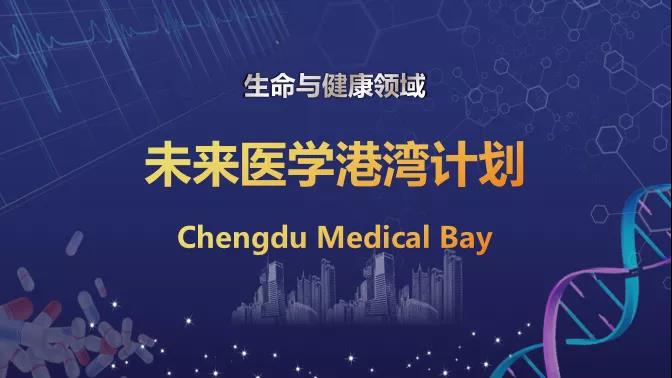
2. The Future Medical Harbor Project.
The Future Medical Harbor is a future medical city integrating medicine, teaching and research with the city of Chengdu on the bank of Sancha Lake in the East New District of Chengdu. It will combine the development trend of new medicine in the next 10-15 years. The purpose is to build a unique and world-leading High Altitude Medicine, Disaster Medicine and Deep Earth Medicine. Specifically, we will develop six clinical medical centers, namely, the high altitude disease medical center, transplantation and regeneration center, blood tumor center, infectious disease center, metabolic disease center and emergency medical rescue center.
Drawing upon the comprehensive advantages of Wei Yuquan and others in the fields of biotherapy, innovative drugs and West China Medicine, we will build a world-class national medical center. The chief scientist of the project is Wei Yuquan.

3. Integration of heaven and earth and ecological evolution project.
Human activities on the earth's surface, climate change and activities in the earth's interior interact, correlate and evolve with one another, and together affect the changes of ecology and environment. To study the interaction and evolution mechanism between the elements of heaven, earth and man is an important guarantee for the harmonious coexistence between man and nature. To meet the major national strategic needs of ecological barrier protection, international carbon emission compliance, and the establishment of natural disaster prevention and control system in the upper reaches of the Yangtze River, we will focus on the spatial and temporal distribution pattern and evolution driving mechanism of biodiversity in Southwest China and the Qinghai-Tibet Plateau, the core technologies of carbon neutralization, the evolution law and early identification of major natural disasters such as earthquakes, landslides, and mountain torrents, intelligent monitoring, and emergency handling technology. Our work is focused on the development of a bank of over one million biological samples in Southwest China, the Qinghai-Tibet Plateau Biodiversity Observation Station, the carbon neutral technology innovation center and research facilities, a research center for disaster prevention and mitigation, and the deep/surface environment experimental facilities.
On the basis of Xie Heping's research in deep underground science, Shi Bi's research in clean tanning technology, and Zhong Benhe's research in phosphorus chemical engineering, this project aims to integrate ecology, environment, energy, comprehensive disaster reduction, deep underground science, artificial intelligence and so forth. The chief scientist of the project is Shi Bi.
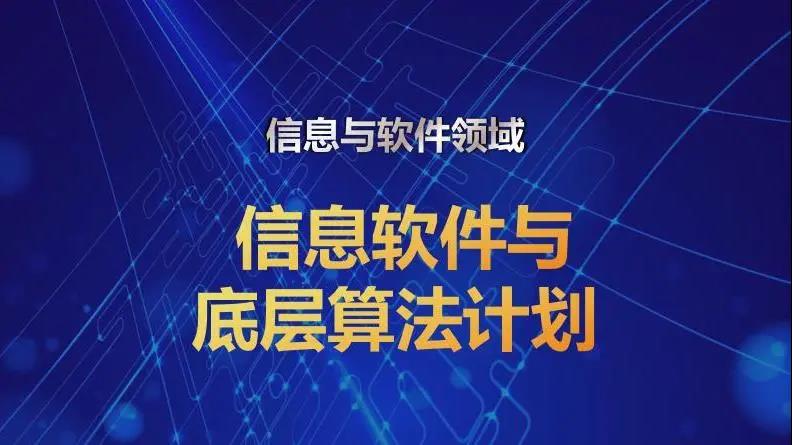
4. Information software and underlying algorithm project.
The new generation of information technology is the strategic commanding heights of the competition among countries in the future. Software is the important foundation of information technology. The underlying mathematical algorithm and software architecture design are the key to large-scale industrial software. The project will focus on optoelectronic and microelectronic devices and integration, underlying mathematical algorithm and software architecture design, and enhance the independent innovation and self-control ability of large-scale industrial software. It combines the development needs of the Chengdu Future Science and Technology City to build large-scale industrial software innovation center and other important research platforms.
Employing Li An-min's research in basic mathematics of differential geometry and You Zhisheng's(distinguished professor) research in the field of computer application technology, this project will promote the integration of Mathematics, Physics, Mechanics, Electronic Information, Computer Science and other advantageous disciplines. The chief scientist is Li An-min.
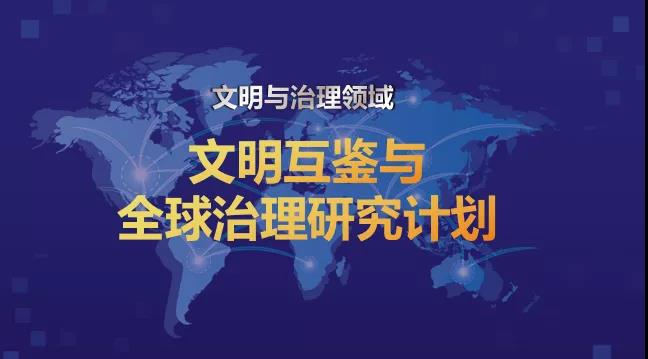
5. Mutual learning among civilizations and global governance research project.
The purpose of the study on mutual learning of civilizations and global governance is to intensify exchanges and mutual reference among different civilizations in the world, boost China's cultural confidence, and accelerate the development of a socialist cultural power and the great revival of the Chinese civilization. This project focuses on the diversity of human civilization, Chinese language and literature and world civilization, ancient Chinese characters, the inheritance and innovation of excellent traditional Chinese culture, Bashu culture and civilization inheritance, Confucianism, Buddhism and Taoism in the global context, as well as the great changes and national governance in the world in a century.
Drawing upon the research of Xiang Chu's(distinguished professor) in Dunhuang studies, Cao Shunqing's (distinguished professor) in comparative literature, Luo Zhitian's (distinguished professor) in modern Chinese history, Zhan Shichuang's (distinguished professor) in Taoism, and Huo Wei's(distinguished professor) in archaeology, the project aims to build an academic school of Sichuan University with Chinese features and produce a number of original achievements in the development of new liberal arts. The chief scientists of the project are Cao Shunqing, and Huo Wei.
In order to ensure the implementation and orderly progress of the program, the university will set up a multi-disciplinary and cross college team to connect with the national major science and technology plan and the development plan of science and technology innovation bases, and seek national support. To meet the needs of the construction of the Chengdu- Chongqing twin city economic circle, the "14th five-year plan" of Sichuan Province and Chengdu, and the local industrial transformation, we will seek the support of local governments. In connection with the double first-class development of the Ministry of Education and Sichuan University, we will guarantee support with regard to talent, funds and conditions.


